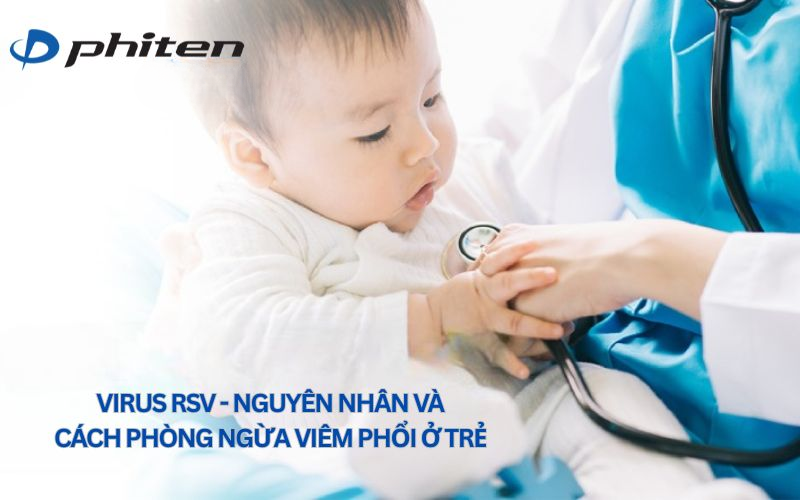What is RSV in Children? Causes, Symptoms & How to Prevent Pneumonia
As parents, nothing is more important than the health of our children, especially when dangerous viruses like RSV (Respiratory Syncytial Virus) can cause serious issues such as pneumonia in children.

If you've heard of RSV but aren't quite sure what it is, this article will help you understand this virus in depth, from how it spreads and its symptoms to effective prevention measures. With detailed, accessible, and educational information, Phiten Vietnam hopes you'll feel more confident in protecting your little one from this illness.
What is RSV (Respiratory Syncytial Virus)?
RSV, or Respiratory Syncytial Virus, is a leading cause of respiratory illnesses in young children, especially infants and those under 2 years old. This virus belongs to the Paramyxoviridae family and commonly appears during the rainy or winter seasons in Vietnam. RSV spreads easily through respiratory droplets in the air when an infected person coughs or sneezes, or through contact with virus-contaminated surfaces, such as toys or doorknobs.
According to the World Health Organization (WHO), nearly all children will be infected with RSV at least once before the age of 2. However, in some cases, especially premature babies or those with underlying health conditions, this virus can lead to serious complications such as pneumonia or bronchiolitis. Understanding RSV thoroughly is the first step in protecting your child from these risks.
Characteristics of RSV
The RSV virus has the ability to attack the respiratory system, especially the lungs and small airways. When it enters the body, it causes syncytia formation, meaning the respiratory cells are damaged and fuse together, leading to inflammation and airway obstruction. This explains why children with RSV often have difficulty breathing, especially infants with their small airways. This virus is highly contagious in crowded environments such as daycare centers or families with multiple young children. Notably, RSV can survive on hard surfaces for many hours, so disinfecting a child's living environment is extremely important. If you want to learn more about how the virus spreads, please read our article on respiratory illnesses in children on our website.
The Importance of Understanding RSV
Awareness of the RSV virus not only helps parents detect early signs of illness but also minimizes the risk of dangerous complications. In Vietnam, where respiratory illnesses in children account for a high percentage of hospitalizations, understanding RSV can help you make timely decisions, such as taking your child to the doctor as soon as severe symptoms appear. Furthermore, raising community awareness also contributes to reducing the spread of the virus, especially during seasonal outbreaks.
Symptoms of RSV Infection in Children
When children are infected with the RSV virus, symptoms can appear 2 to 8 days after exposure. What makes RSV tricky to recognize is that in the early stages, the symptoms often resemble a common cold, but they can quickly progress to more serious issues. Early recognition of these signs is crucial to ensure timely care for your child. Below, we will analyze the symptoms from mild to severe.
Mild RSV Symptoms in Children: Early Signs to Watch For
In the early stages of RSV infection in children, common symptoms include a runny nose, mild cough, sneezing, and sometimes a slight fever. These initial signs can last for a few days and are often mistaken for the common cold. For instance, you might observe your child having a clear or slightly cloudy runny nose accompanied by a dry cough. During this period, infants may still breastfeed and young children might continue to play normally, but close monitoring by parents is crucial. To help alleviate discomfort, you can use saline nasal drops or spray to gently clear their nasal passages.
Severe RSV Symptoms in Children: When to Seek Immediate Help
If the RSV virus progresses, children may experience more serious symptoms, such as wheezing, difficulty breathing (shortness of breath), high fever, or even blue lips and skin (cyanosis) due to a lack of oxygen. These signs often appear when the virus causes inflammation in the lungs or bronchioles, leading to pneumonia or bronchiolitis. Your child might become unusually tired (lethargic), have poor feeding, and be irritable. In some cases, you may hear a whistling sound (wheezing) when your child breathes or notice their chest retracting (sucking in) when they inhale. These severe symptoms are particularly dangerous in children under 6 months old, as their respiratory systems are still very fragile. According to the Vietnam Ministry of Health, RSV is a leading cause of hospitalization in infants during the rainy season. Seek immediate medical attention if your child exhibits any of these severe RSV symptoms.
When to Take Your Child to the Doctor for RSV
If you notice your child exhibiting signs such as rapid breathing, chest retractions (drawing in of the chest wall), poor feeding, or lethargy (unusual tiredness and lack of energy), seek immediate medical attention. These symptoms indicate that your child may be having serious difficulty breathing, and delaying treatment can lead to dangerous complications. Especially if your child has a history of prematurity (being born prematurely), heart disease, or chronic lung disease, the risk of complications is higher.
Risks and Complications of RSV Virus
The RSV virus doesn't just stop at common respiratory symptoms; it can also cause serious complications, especially in children with weakened immune systems or those belonging to high-risk groups. Understanding these risks will help parents accurately assess the severity of the illness and develop an appropriate care plan.
RSV Pneumonia: A Serious Complication in Children
One of the most concerning complications of the RSV virus is pneumonia, which occurs when the virus damages the alveoli (air sacs) in the lungs, causing inflammation and fluid buildup. This makes it difficult for children to breathe and may necessitate oxygen support in the hospital. RSV pneumonia is particularly dangerous in infants because their lungs are not yet fully developed. Signs of pneumonia include a persistent high fever, rapid breathing, and severe lethargy (unusual tiredness). According to research from the U.S. Centers for Disease Control and Prevention (CDC), RSV causes millions of cases of pneumonia in children worldwide each year.
Other Complications of RSV
Beyond pneumonia, the RSV virus can also lead to bronchiolitis, an inflammation of the small airways in the lungs, causing wheezing and discomfort in children. Some children may also develop ear infections due to the virus itself or secondary bacterial infections. In rare cases, RSV can cause long-term respiratory issues, particularly in children with a history of asthma. These complications underscore the importance of close monitoring and timely medical intervention.
High-Risk Groups for Severe RSV Infection in Children
While not all children infected with the RSV virus will develop complications, some groups are at a higher risk, including:
-
Premature infants: Their lungs are not fully developed, making them more vulnerable.
- Infants under 6 months old: They have weaker immune systems and smaller airways.
- Children with chronic heart or lung conditions: These underlying health issues reduce their ability to fight off the virus.
- Children with weakened immune systems: For example, children undergoing chemotherapy or with autoimmune diseases.
If your child falls into one of these groups, it's crucial to be especially vigilant during the RSV season.
Diagnosis and Treatment of RSV (Respiratory Syncytial Virus) Infection
Timely diagnosis and treatment of RSV (Respiratory Syncytial Virus) infection are crucial factors in helping children overcome the illness safely. If you notice your child exhibiting unusual symptoms, especially difficulty breathing or a high fever, don't hesitate to contact your doctor. Healthcare professionals will use various methods to determine if your child has an RSV infection and then develop an appropriate treatment plan. The good news is that with proper care, most children can make a full recovery.
Diagnostic Methods for RSV Infection
To diagnose the RSV virus, doctors typically begin by examining the clinical symptoms, such as wheezing, runny nose, or cough. In some cases, they may collect a nasal swab using a nasal swab to perform a rapid antigen test, which helps identify the presence of the Respiratory Syncytial Virus. If pneumonia or bronchiolitis is suspected, the doctor may order a chest X-ray to assess the extent of lung involvement.
Home Care for Mild RSV Infections in Children
For mild cases of the RSV virus, children can often be cared for at home with guidance from their doctor. You can help your child feel more comfortable by using saline nasal drops or spray to gently clear their nasal passages and ensuring they drink enough fluids or breastfeed regularly to prevent dehydration. Keep your child's room well-ventilated and avoid smoke, dust, or tobacco smoke, as these factors can worsen respiratory symptoms.
Medical Treatment for Severe RSV Infections in Children
In severe cases, when the RSV virus causes pneumonia or severe difficulty breathing, children may need to be hospitalized for medical support. In the hospital, doctors can provide oxygen therapy to help your child breathe more easily or administer intravenous fluids to ensure they stay hydrated. In rare instances, a ventilator may be necessary if the respiratory condition becomes critical. Currently, there is no specific antiviral medication for RSV, but doctors can use certain medications to help manage symptoms.
The Role of Antibiotics in RSV Treatment
Many parents wonder if antibiotics can cure the RSV virus. The answer is no, because RSV is a virus, while antibiotics only work against bacterial infections. However, if your child develops pneumonia due to a secondary bacterial infection or other bacterial complications, your doctor may prescribe antibiotics. It's crucial that you follow your doctor's instructions and do not self-medicate.
Preventing RSV Infection in Children: Effective Strategies for Parents
Prevention is always better than cure, especially with the RSV virus, which is highly contagious. Fortunately, there are many simple yet effective ways to protect your child from the Respiratory Syncytial Virus, ranging from maintaining good hygiene to boosting their immunity.
Personal Hygiene Measures to Prevent RSV
The RSV virus spreads through respiratory droplets and contact with contaminated surfaces, making hygiene the first line of defense. Encourage the whole family to wash their hands frequently with soap and water, especially before holding or feeding your child. Avoid exposing your child to people showing cold symptoms, and ensure you regularly disinfect surfaces your child often touches, such as toys, doorknobs, or phones.
Boosting Your Child's Immune System to Fight RSV
A strong immune system is key for children to fight off the RSV virus. For infants, breast milk is an excellent source of natural antibodies, so try to breastfeed your baby for at least the first 6 months of life. For older children, ensure a balanced diet rich in Vitamin C and zinc, found in fruits like oranges and kiwis, or green vegetables. Additionally, sufficient sleep and a clean living environment also help keep children healthier.
RSV Vaccine and Preventative Medications for Children
Currently, there isn't a widely available vaccine for the RSV virus, but scientists are actively working on developing new vaccines. In the meantime, some high-risk infants, such as premature babies or those with congenital heart disease, may be prescribed palivizumab, an injectable medication that helps prevent severe RSV infection.
Conclusion: Protecting Your Child from the Threat of RSV
The RSV virus poses a significant threat to young children, especially in their early years. However, with the right understanding and effective prevention measures, you can absolutely protect your beloved child from the risks this virus presents. From recognizing early symptoms and providing proper care to adopting good hygiene and nutrition habits, every action you take contributes to building a safe environment for your child. Always be your child's trusted companion, and remember that the community also plays a vital role in raising awareness about RSV. Together, we can minimize the impact of this virus and bring about a healthy childhood for our little ones!
:
Frequently Asked Questions (FAQs) About RSV in Children
1.Can RSV spread from adults to children? Yes, the RSV virus can spread from adults to children through close contact, such as kissing or hugging, or via respiratory droplets when coughing or sneezing. Adults often experience mild symptoms but can still be a source of infection. Please wash your hands frequently and wear a mask if you are feeling sick.
2.How long does it take for a child to recover from RSV? Most children with RSV will recover within 1-2 weeks with proper care. However, severe cases, such as those involving pneumonia, may require a longer recovery period and hospital treatment.
3.How can I know if my child is at high risk for severe RSV? Premature infants, children under 6 months old, or those with pre-existing heart or chronic lung conditions are at a higher risk for severe illness from the RSV virus. Discuss your child's individual risk factors with their doctor to assess their situation and implement appropriate preventative measures.
4.How can I differentiate RSV from the common cold in my child? The RSV virus often causes wheezing, difficulty breathing, or a high fever, whereas the common cold typically presents with just a runny nose and a mild cough. If your child exhibits any severe symptoms, it's important to take them to the doctor for an accurate diagnosis.

















